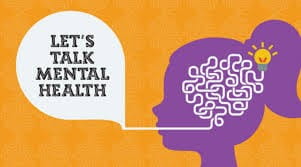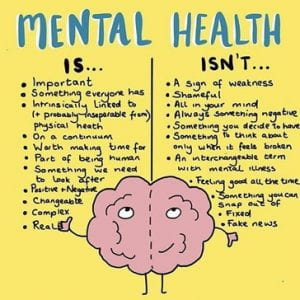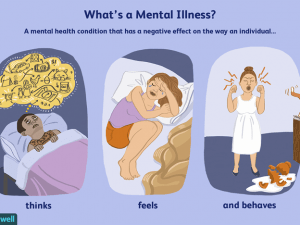In our perfect society and world, everyone is busy with the hustle and bustle of life. We seldom spend time to pause and reflect in our surroundings. We often neglect our physical well-being and more so our mental well-being. If questioned whether we pay enough attention to our “Mental Health,” many of us will have to think what exactly is mental health, or what do they mean by maintaining mental well-being? Mental Health is a highly stigmatized topic to be discussed. It adds imperfection to our perfect worlds. But often Mental Health is mistaken with Mental Illness or the words are used interchangeably. However, both terms are different and are equally essential to be discussed and understood. Let us dive into this most “hush-hush” topic and enlighten ourselves with the true meaning of these terms and its impact on public health globally.
What is Mental Health?
The World Health Organization defines Mental Health as “a state of well-being in which the individual realizes his or her own abilities, can cope with the normal stresses of life, can work productively and fruitfully, and is able to make a contribution to his or her community.” Thus, mental health is the foundation for emotions, thinking, communication, learning, resilience, and self-esteem. Mental health is also key to relationships, personal and emotional well-being and contributing to community or society.
What is Mental Illness?
The United States Centers for Disease Control and Prevention defines Mental Illnesses as “conditions that affect a person’s thinking, feeling, mood or behavior, such as depression, anxiety, bipolar disorder, or schizophrenia. Such conditions may be occasional or long-lasting (chronic) and affect someone’s ability to relate to others and function each day.” Many factors play part in disrupting an individuals state of mind including early adverse life experiences such as trauma or history of abuse, experiences related to ongoing medical conditions such as cancer or diabetes, biological factors such as genes or chemical imbalances in brain, use of alcohol or recreational drugs, having a feeling of loneliness or isolation and having few friends. The World Bank estimates at least 10% of the world’s population to be affected by some type of mental disorder. Also, it estimates 20% of children and adolescents being affected by the same. The World Health Organization data identifies mental illness to account for 30% of the non-fatal disease burden and 10% of the overall disease burden worldwide including death and disability. Many people who have a mental illness do not want to talk about it. But mental illness is nothing to be ashamed of! It is a medical condition, just like heart disease or diabetes. And mental health conditions are treatable. Mental illness does not discriminate- in a sense that it can affect anyone regardless of your age, gender, geography, income, social status, race/ethnicity, religion/spirituality, sexual orientation, background, or other aspect of cultural identity. Mental illnesses take many forms. Some are mild and only interfere in limited ways with daily life, such as certain phobias (abnormal fears) as compared to other mental health conditions which are so severe that a person may need care in a hospital.
Mental Health and The Stigma
Mental Illnesses are health problems just like arthritis, diabetes, cancer, or heart disease. However, people who suffer from any type of mental disorder are looked upon differently by the society. This negative attitude and discrimination against someone based on a distinguished characteristic such as mental illness is termed as “Stigma.” This prejudice and discrimination of society against mentally ill individuals often leads to ignorance and neglect for mental well-being. It is estimated that around 40% of individuals suffering from anxiety or depression do not seek medical care for their illness owing to social stigma. Social stigma seriously affects well-being of the individual experiencing it. Also, it targets individuals while experiencing mental problems, while they are in treatment phase, while they are healing or even after their illness is a distant memory. Stigma also has a strong effect on individuals’ feelings and perceptions about themselves and the way others see them. Therefore, it becomes essential to remove this stigma. Some steps to reduce stigma against mental illness and improve awareness for mental health are as follows:
- Know the facts. Educate yourself about mental illness including substance use disorders.
- Be aware of your attitudes and behavior. Examine your own judgmental thinking, reinforced by upbringing and society.
- Choose your words carefully. The way we speak can affect the attitudes of others.
- Educate others. Pass on facts and positive attitudes; challenge myths and stereotypes.
- Focus on the positive. Mental illness, including addictions, are only part of anyone’s larger picture.
- Support people. Treat everyone with dignity and respect; offer support and encouragement.
- Include everyone. It is against the law to deny jobs or services to anyone with these health issues.
Mental Health and Global Approach
Mental illness and substance use disorders contribute as one of the leading causes for disability globally. The reported burden of mental disorders shows a compounded increase owing to the “mental health treatment gap.” This gap accounts for more than 70% of individuals worldwide, who need mental health care services but unfortunately lack resources or access to such care. Ironically, this gap has been identified when the world has sufficient evidence supporting effective mental health interventions in limited resource environments. Data from several research studies shows compelling evidence for the efficacy and effectiveness of both psycho-pharmacological treatment and evidence-based psychotherapies for treating mental disorders.
Global mental health involves the study, research, and practice of improving mental health for all people worldwide. It takes into consideration disparities in mental health treatment and care across cultures and countries. To reduce the global mental health treatment gap, the World Health Organization (WHO) developed the Mental Health Gap Action Programme Intervention Guide (mhGAP-IG) which comprises of straightforward, user-friendly, diagnosis-specific clinical guidelines for providing evidence-based practices (EBPs) to be used by non-specialized health care providers after adaptation for national and local needs.
For us, as individuals, we should educate ourselves to be considerate of the sufferings of mentally ill person. We can hold ourselves above the social stigma against mental health and try to bring the “Mental Health” out of shadows.






I love the picture you shared about Mental Health Stigma and Awareness; it really is important to be aware of mental health so that we can help those who need it! Also, great blog!!!
Thank You!